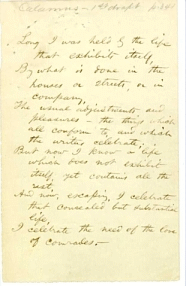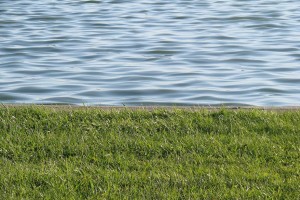
IN paths untrodden,
In the growth by margins of pond-waters,
Escaped from the life that exhibits itself,
From all the standards hitherto published—from
the pleasures, profits, conformities,
(Calamus, 1860)

Here, of all words I have highlighted one that is by no means unusual or unknown to me, and it was completely in its place to me when I first read the poem. Indeed, the Longman Dictionary of Contemporary English provides the following definition of the word margin:
Margin – technical or literary – the edge of something, especially an area of land or water
This definition of the word margin fits the context of the poem perfectly and gives no reason to ponder over the possibility of some deeper, hidden meaning of the word. Still, something was a bit awkward about that particular choice of words that made me push my way a little deeper in the word itself. Therefore, I wondered, apart from the very clear and appropriate denotation of the word in question, which connotation of the same word can be applied to the same context to produce just as legitimate interpretation, and several ideas emerged.
Firstly, the word margin can have a very strong negative connotation as in social marginalization, and if read this way, the poem acquires a new level of reading which made sense, especially if we consider that the passage is from the Calamus 1, the first (introductory?) poem of the Calamus cluster, which was more than radical at the time it was published in 1860. Given that some poems of the Calamus are somewhat radical even today, 150 years later, it is justified to claim that Whitman himself was well aware that his poetry will be marginalized, that it will not be accepted nor understood for generations to come. Indeed, later throughout the Calamus poems, there exist several instances in which Whitman “speaks” of and to generations to come, and puts his faith in them (us?) to really read his poetry with much less prejudice and much more open-mindedness. I have tried to imagine what was it like for someone to write the poetry such as the Leaves of Grass in the mid nineteenth century, and I could not find a way how that someone could not be marginalized, how they could be properly understood by more than a dozen equally talented and equally misunderstood people.
Furthermore, thinking about this negative idea of margin, one another possibility came to my mind which is related with the previously discussed interpretation of the word. One of the basic meanings of the word margin is the blank space on one side of the paper where one can take notes. Now, if we expand and deepen this definition to fit the entire body of works of Walt Whitman, we might claim that the use of the word margin here indicates Whitman’s realization that when a new kind of poetry is to be born, and especially if it springs from a philosophical and moral system radically different from the existing one, it has no other place available to be written on than on margins of literature. And only after the supporting social and cultural systems change, the new poetry will be allowed to shift from margins to a more central position in literature. So could it be that Whitman was aware that his poetry will inevitably have to spend its share of time on the margin, but still carried on knowing that one day, just as inevitably, it will be appreciated by the multitudes?
These two interpretations of the word margin might be my reading in into the poem, but I still would like to provide one other proof of my readings of the poem. Namely, one other word used in the poem supports my readings – the word standards. These can be standards of what is considered good or appropriate by a society, supporting my first interpretation, but can also stand as the centre, as opposed to the margin, which is then consistent with my second interpretation. Then again, I could be completely wrong.
Tags: imagegloss
One Response to “Calamus”
Leave a Reply
You must be logged in to post a comment.
“Margin” really is an interesting word–the kind that gets more complex the more times you repeat it to yourself. Your post also make me think of the layers that an idea can pick up over time, almost like lint, or graffiti . . .
Within Whitman’s own work, my mind also flashes to the 1855 Preface: “For such the expression of the American poet is to be transcendant and new. It is to be indirect and not direct or descriptive or epic.” He seemed to thrive on looking at life from strange angles, peripherally; maybe that was what it took for him to generate the kinds of mysteries that would make readers struggle and grow.